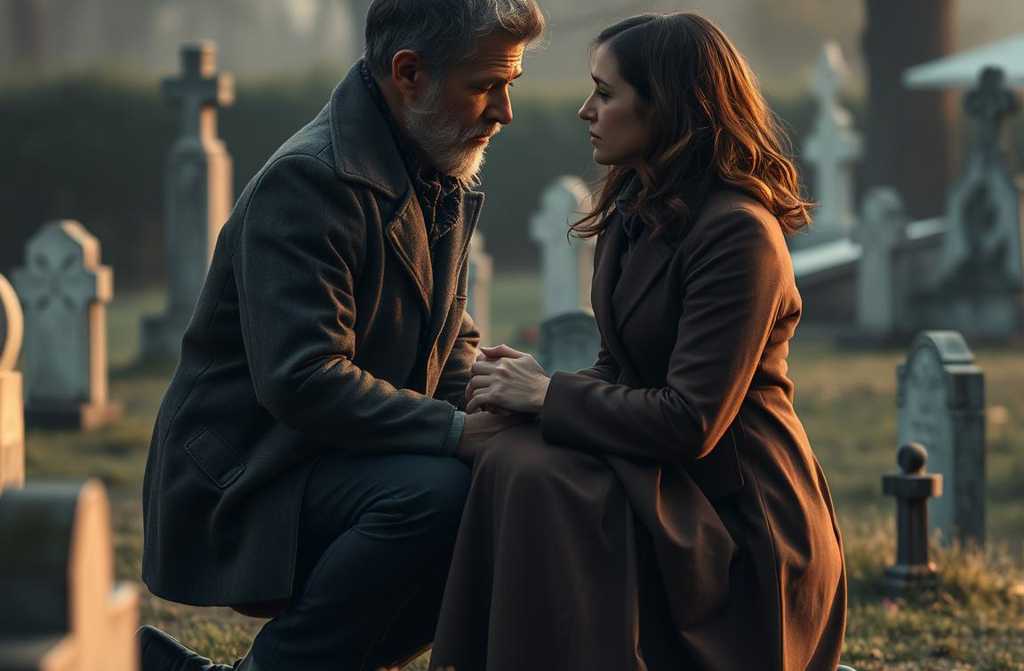At the graveside, a wealthy woman heard a homeless man ask, “Did you know my mum too?” She collapsed in shock.
For most, a cemetery is a place of farewells, grief, and endings. For Lenny, it had become something like homenot literally, since he had no roof unless you counted the crumbling granite mausoleum he crawled into during the harshest winters. But in spirit, in soul, he belonged there.
Silence reigned, broken only by birdsong and the occasional sob of mourners. Here, no one looked down on him, chased him away, or pointed at his threadbare jacket and battered shoes. The dead didnt careand in that, there was a strange, comforting justice.
Lenny woke to the cold, morning dew soaking his cardboard blanket. The air was crisp, mist curling over the graves as if shielding them from the world. He rubbed his eyes and, as he did every day, surveyed his kingdomrows of crosses, headstones, moss creeping over forgotten names.
His morning didnt start with coffee but with rounds. He checked if wreaths were untouched, flowers undisturbed, if strangers had left footprints in the night. His only friendand de facto bosswas Stan, the grizzled caretaker with a rough voice but kind eyes.
“Still here like a stubborn weed?” Stan called from his shed. “Come get some tea before you catch your death.”
“Be right there,” Lenny replied, still preoccupied.
He made his way to a modest grave in the far corner. A plain grey slab read: “Antonia Margaret Wilson. 19652010.” No photo, no epitaph. But to Lenny, it was sacred. Here lay his mother.
He barely remembered herneither her face nor her voice. His earliest memories were of the childrens home, of sterile walls and unfamiliar faces. She had left too soon. Yet at her grave, he felt warmth, as if unseen hands still comforted him. Mum. Antonia.
He plucked weeds, wiped the stone with a damp cloth, straightened the wilting wildflowers hed left the day before. He spoke to herabout the weather, the cawing crows, Stans lentil soup. He complained, thanked, begged for protection. He believed she listened. That belief was his anchor. To the world, he was nobody. But here, by this stone, he was someone. He was her son.
The day wore on. Lenny helped Stan repaint a rusted fence, earned a bowl of stew, then returned to his “mum.” He crouched, describing how sunlight pierced the mistwhen the crunch of gravel shattered the quiet.
A sleek black car rolled through the gates. A woman stepped out, looking as though shed stepped from a magazinecashmere coat, flawless hair, grief etched with dignity. She carried an armful of white lilies.
Lenny shrank back, but she walked straight to him. Straight to his mothers grave.
His chest tightened. She knelt, uncaring of her expensive clothes, and laid the lilies beside his humble bouquet.
“Excuse me,” Lenny whispered, unable to stay silent. “Did did you know her?”
She startled, wet eyes lifting to his.
“Yes.”
“You knew my mum?” he asked, painfully earnest.
Confusion flickered across her face. She took in his tattered clothes, gaunt frame, guileless eyesthen re-read the headstone: “Antonia Margaret Wilson.”
Understanding struck like lightning. She gasped, turned white, swayed. Lenny caught her before she hit the stone.
“Stan! Help!”
The caretaker rushed over, assessed the situation, and barked, “Get her inside!”
They half-carried her to the shed, its air thick with tea and tobacco. Stan splashed water on her face, pressed smelling salts under her nose. She groaned, blinked dazedlythen locked eyes with Lenny, who stood twisting his worn cap in his hands.
Her stare was long, searching. Shock gave way to unbearable sorrowand something like recognition. She reached out, whispered words that upended his world:
“Ive searched for so long.”
Lenny and Stan exchanged stunned glances. Stan handed her water. She sipped, steadied herself, and spoke.
“My name is Natalie. To explain I must start from the beginning.”
Her story spanned decades.
A young woman from a provincial town, shed come to London dreaming of more. Penniless, she became a maid in a wealthy home. The mistressa cold, domineering widowruled with iron. The only light was the widows son, Edward: charming, weak, utterly obedient.
Their love was secret, doomed. When Natalie fell pregnant, Edward promised to stand by heruntil his mother intervened. No poor bride, no bastard heir. Natalie would stay until the birth, then be paid off and sent away; the child, to an orphanage. Only one person showed her kindnessanother maid, Antonia.
Quiet, unassuming, Antonia brought her food, comfort, company. Natalie never noticed the shadow in her eyesenvy, bitter and deep. Envy of her youth, her beauty, Edwards love, even the child Antonia herself could never have.
The birth was brutal. When Natalie woke, they told her the baby had been stillborn. Numb with grief, she was cast out with a pittance. Edward never said goodbye.
Years passed. The pain dulleduntil Natalie learned the truth. Antonia had quit soon after, leaving a confession with a fellow maid: shed swapped Natalies healthy son for a stillborn, bribing a nurse. Shed stolen him.
Why? A twisted mix of pity and longing. Shed wanted to be a mother, to love, to claim some fragment of the life shed been denied. The note vowed shed raise him as her ownthen she vanished.
Natalie searched. Years. Decades. Private investigators, dead ends. Her son had disappeared.
Now, she finished her story, watching Lenny, who sat shell-shocked. Stans forgotten cigarette burned to ash.
“Antoniathe woman you called mumwas my friend. And my thief. She took you from me. I dont know why she left you at the orphanage. Maybe guilt broke her. This grave perhaps she bought it to repent.”
Lennys world crumbled. The woman hed loved was his kidnapper. His real mother sat before himelegant, unfamiliar.
“Theres more,” Natalie whispered. “Months ago, Edward found me. Your father. His mothers death left him wealthy but empty. Now hes dying. Weeks, maybe days. He begged me to find you. To bring you to him.”
Silence. The only sounds were the sheds ticking clock and Lennys ragged breaths. The truth was too vast, too cruel.
He stared at his grimy hands, frayed cuffs, hole-riddled shoes. His whole lifehunger, cold, lonelinessbuilt on lies.
“Natalie, I cant,” he choked. “Look at me”
“I dont care!” she snapped. “Youre my son. Were going. Now.”
She stood, hand outstretched. Something in him broke. Trembling, he took it. Stan nodded, gruff approval in his eyes.
The drive to the hospice stretched endlessly. At first, silence. Lenny sat rigid, afraid to dirty the leather seats. Then Natalie whispered,
“Were you very cold in winter?”
“Sometimes.”
“Were you alone?”
“Had Stan. And her.” He glanced back at the cemetery.
Something shattered. Natalie wept quietly; Lennys tears streaked his dirty cheeks. They spokeof lost years, of pain, of how loneliness had gnawed at them both. In that car, strangers became mother and son.
The hospice smelled of antiseptic. They were led to a private room. Edward lay skeletal, barely breathing.
“Edward,” Natalie murmured. “I found him. Our son.”
His eyelids fluttered open. His gaze found Lenny. Recognition flickeredpain, remorse, relief. A frail hand twitched.
Lenny stepped forward, clasped those cold fingers. No words were needed. In that touch was forgiveness unasked, love undeserved. He saw his own eyes in his fathers fading onesand let go of every bitterness.
Edwards grip tightened faintly. A ghost of a smile. Then his hand went slack. The monitor flatlined. He died holding the son hed lostand foundin his final moment.
Natalie hugged Lenny from behind. They stood together, facing a new realityone without lies. Only truth. Only pain. Only the beginning of a life theyd share at last.
*Sometimes the past arrives too latebut its never too late to heal.*







